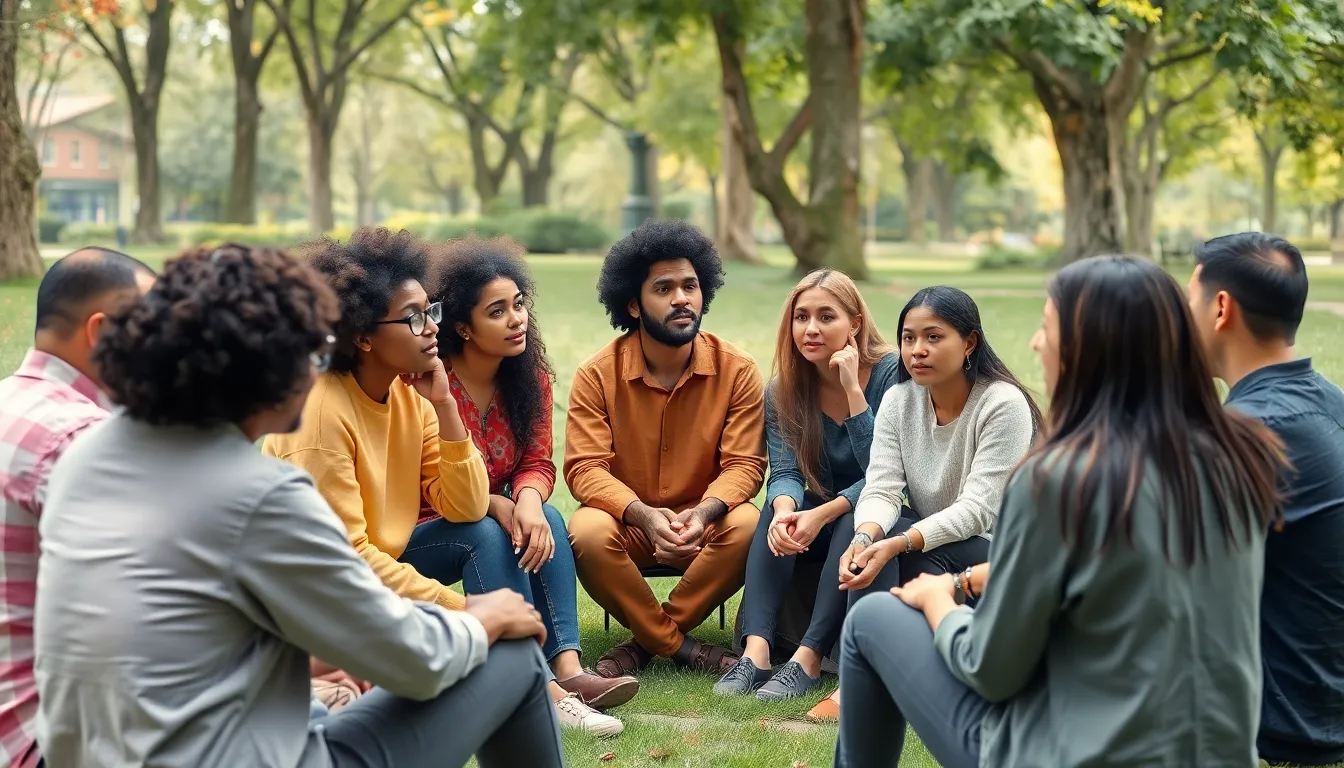Table of Contents
ToggleIn a world where everyone’s trying to be woke, the question “Am I racist?” can feel like stepping on a landmine. It’s a loaded query that might make even the most well-meaning person sweat a little. But don’t panic! This isn’t a self-help seminar; it’s a journey into self-discovery that might just make you chuckle along the way.
Navigating the complexities of race and bias isn’t easy, but understanding oneself is the first step toward growth. With insightful reviews and a sprinkle of humor, this article aims to shed light on those awkward moments we all have. So grab a cup of coffee, take a deep breath, and let’s dive into the world of self-reflection—because who doesn’t love a little introspection mixed with a dash of laughter?
Understanding Racism
Racism involves prejudice against individuals based on race. This complex issue manifests in numerous ways and varies by context.
Defining Racism
Racism refers to beliefs and actions that discriminate against others due to their race. It encompasses both individual attitudes and systemic practices. These prejudices can result in harmful stereotypes and unequal treatment. A deeper understanding requires recognizing implicit biases and societal influences. Definitions can differ across cultures, making global discussions on racism vital. Each perspective offers unique insights into combating these negative attitudes.
Types of Racism
Racism can exist in several forms. Individual racism includes personal beliefs and actions that express racial bias. Structural racism involves systemic inequality built into institutions and laws. Institutional racism occurs within organizations and affects access to resources and opportunities. Cultural racism promotes stereotypes through media and societal norms. Identifying these types helps in recognizing racism’s widespread impacts. Awareness allows for targeted actions to challenge and dismantle these structures effectively.
The “Am I Racist?” Reviews Concept

The “Am I Racist?” reviews concept engages individuals in an essential journey of self-discovery. The reviews focus on honest assessments of personal beliefs and behaviors regarding race.
Overview of Reviews
Reviews often highlight how introspective questions can reveal unconscious biases. Users share experiences reflecting on their attitudes towards diverse groups. These reflections provide valuable insight into their thought processes and behavioral patterns. Different perspectives from reviewers showcase varied experiences with racism and personal growth. Ultimately, the reviews connect readers with relatable stories that inspire change.
Importance of Self-Reflection
Self-reflection plays a crucial role in addressing individual biases and prejudices. Examining personal beliefs fosters greater awareness of societal influences. Engaging in this process enables individuals to recognize harmful stereotypes and challenge their ingrained attitudes. When people reflect on their experiences, they can see how these shape interactions with others. Embracing self-reflection proves vital in cultivating empathy and understanding toward different communities. This journey not only enhances personal growth but also contributes to broader societal change.
Key Features of “Am I Racist?” Tools
“Am I Racist?” tools provide a comprehensive approach to understanding personal biases. They incorporate various features designed to facilitate self-reflection.
Assessment Methods
Assessment methods vary among tools, but many utilize quizzes to uncover unconscious biases. Questionnaires typically gauge emotional and cognitive responses towards different racial groups. Some platforms employ scenario-based tasks to assess reactions in hypothetical situations. Data analysis algorithms often analyze responses, generating personalized feedback. This feedback creates opportunities for users to reflect on their beliefs and behaviors.
User Experiences
User experiences frequently highlight the transformative nature of these tools. Many individuals report significant insights gained through honest self-assessment. Shared experiences reveal a common theme of discomfort followed by growth. Participants often express a sense of relief after identifying biases. Additionally, users indicate an increased commitment to fostering inclusivity in their communities. Each story emphasizes the value of vulnerability in this journey toward understanding.
Analyzing Critiques of “Am I Racist?” Reviews
Critiques surrounding “Am I Racist?” reviews reveal significant insights into individual experiences and perceptions of racism. These reviews often uncover feelings of discomfort among users, reflecting societal pressures and personal insecurities.
Common Concerns
Users frequently mention fears of being judged when engaging with racist concepts. Many express anxiety about confronting their biases, fearing social backlash or misunderstanding. Participants in discussions note a lack of safe spaces for these sensitive conversations. They highlight that a judgment-free environment is essential for honest reflection. Furthermore, critiques emphasize the complexity of defining racism, with many feeling overwhelmed by its various forms. Overall, concerns indicate a need for supportive dialogue and resources that foster mutual understanding.
Effectiveness of Tools
Tools designed for assessing racist beliefs often receive mixed reviews regarding their effectiveness. Some users report significant personal breakthroughs through quizzes and scenario-based tasks, revealing unconscious biases. Others question the depth of feedback provided, feeling it lacks sufficient guidance for making meaningful changes. Feedback indicates a desire for more comprehensive resources and practical strategies. Users often acknowledge the transformative potential these tools have on their understanding of racism. Many agree that while these tools are helpful, ongoing discussions and education remain vital for long-term change.
Self-reflection on biases and attitudes toward race is a vital step in personal growth. The “Am I Racist?” reviews offer a unique opportunity for individuals to confront their beliefs in a supportive and engaging manner. By embracing the discomfort that often accompanies this journey, individuals can foster empathy and understanding.
The insights gained from these assessments can lead to meaningful conversations about racism and its impact on society. Recognizing the complexities of racism allows for a more informed approach to combating prejudice. As people continue to explore their own biases, they contribute to a broader movement toward inclusivity and social change.





